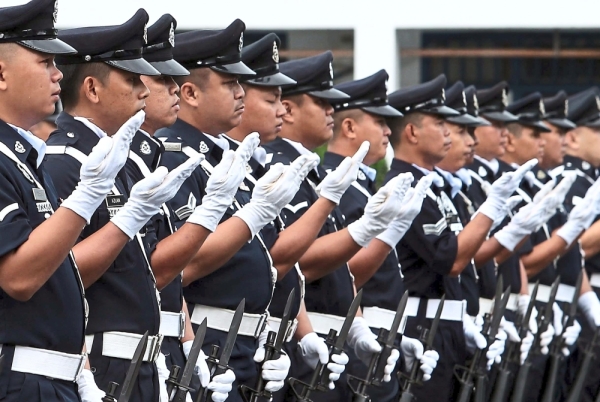
ON Labour Day, May 1, Prime Minister Tun Dr Mahathir Mohamad confirmed that acting deputy Inspector-General of Police Datuk Seri Abdul Hamid Bador, 61, will succeed Tan Sri Mohamad Fuzi Harun as the nation’s top policeman.
Based on my observations, in Malaysia today these are, arguably, the two most important and toughest jobs in the public service: The IGP and the head of the Malaysian Anti-Corruption Commission (MACC).
Looking at the present scenario, the new IGP faces a tough and challenging job in heading and managing the department. Abdul Hamid must confront the reality that the Royal Malaysian Police (PDRM) has officers among its ranks who are “poisoning the well†and need to be weeded out.
In a survey conducted in 2017, about 57% of the Malaysian participants of TI-M Global Corruption Barometer survey felt that the police were the most corrupt among public institutions. (Thailand, at 78%, and Pakistan, at 76%, topped the list in the Asia Pacific region.)
It is unfortunate that police officers who had been entrusted to take action against illegal activities, including prostitution and gambling, have been protecting those operators and syndicates. Corruption is worse than prostitution as it will tarnish the image and the weaken the security of the country – no public servant should betray his country by accepting bribes from those syndicates.
Their actions also taint the reputation of police officers who are dedicated, hardworking, and conscientious in carrying out their duties in the community.
Hence, Abdul Hamid should make sure that our police force will not compromise in its fight against such crimes. The department must strive to improve its image and work towards zero tolerance of corruption and be committed in fighting corruption and malpractice at every level because without integrity, everything the department does is flawed.
The position of the IGP is more than just another job in the police force. As the head of the entire force, the IGP serves as a public figure in the community. He must display the important characteristics and qualities of high integrity, fairness and the ability to be stern.
Operating without fear or favour is essential. Nobody should be considered above the law, including high-powered politicians. Politicians can try to interfere in criminal matters but as an IGP, he can exercise his right to ignore them, especially when a request is not in accordance with the law.
The IGP needs to carry out his leadership duties by being an example – he must be “whiter than whiteâ€.
I also feel that the IGP should undertake a thorough overhaul of personnel, strategies and training. The PDRM needs to consider increasing entrance level requirements for their lowest positions so that new personnel can face the latest challenges as well as the public’s higher expectations.
Balancing traditional training components (technical and tactical aspects of policing) with working with the community as partners to achieve safety is essential.
For example, community policing, or problem-oriented policing, as a strategy of policing focuses on the police working closely with members of the community should be enhanced. Accountability of both law enforcement and the local populace is inbuilt in this type of working relationship. Modern policing is a “people business†and not an “enforcement businessâ€.
The effectiveness of the Integrity and Standards Department (JIPS) has to be relooked and improved to make the PDRM respected and stronger in fighting corruption within its ranks.
The other most important strategy is to take care of the welfare of the rank-and-file officers. Some lower ranking officers working in expensive Klang Valley areas such as Taman Tun Dr Ismail, Bangsar and Bukit Damansara have no choice but to rent cheap apartments in Cheras. Those who did not get quarters have to spend more than half of their salary to rent an apartment.
I believe the staff are underpaid and overworked. A constable’s
salary scale is between RM1,014 and RM3,517 – it’s difficult to survive on that in Kuala Lumpur and other big cities. The government needs to seriously consider increasing the PDRM’s budget and rank-and-file officers’ salaries, and provide them with good infrastructure and facilities.
A salary hike may not totally wipe out corruption but it will definitely help reduce the temptation to take bribes.
There is no denying that parts of the public tends to “demonise†the PDRM and demoralise its officers. Abdul Hamid should identify the reasons for such a negative perception of a force that has done much to keep the public safe.
He must address the demoralisation of officers and men immediately. The public must learn to respect the police again under this new leadership. This can be achieved if the public works together with the police.
Moving forward, for the police force to regain public confidence, every officer needs to work professionally, without interference from any parties and, more importantly, each must perform his duties without compromising integrity. Keep politics out of policing, there should be no political inference in police administration.
Yes, there is room for the PDRM to improve standards, enhance professionalism, and engender consistent respect for law enforcement personnel.
Abdul Hamid’s past experience in the force, especially in the Special Branch, can be put to good use to strenghten the police force and deal with the many new threats to our security, including those from the Islamic State terrorist group.
Improve supervision skills, monitoring and managing control, and the integrity level of the PDRM. He’s the man to do it, as he is known to be professional and hardworking.
The people want to be proud of their police force and they deserve to be. Let’s all work together to make this a reality.
Source : Thestar
Date : 06/05/2019


